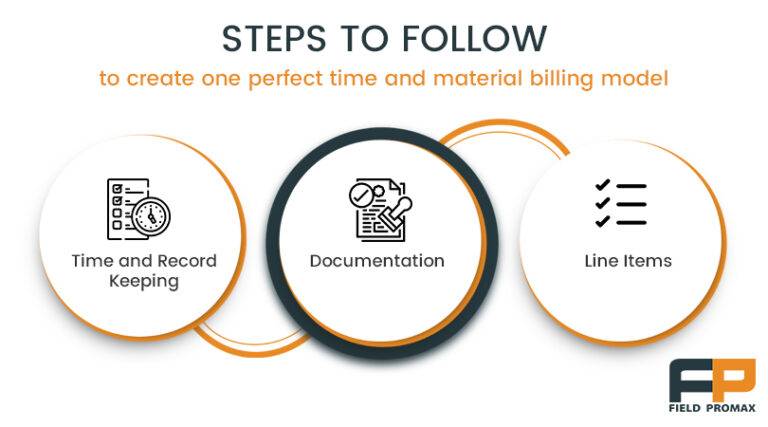How do I get paid on time and in full?
This is a question that keeps many service business owners up at night. The unique thing about field service is that the actual job takes place outside the office, and in most cases, the owner is not present there to collect the payment. Even if you are, there is no guarantee that you’ll get paid instantly or for the total amount—for a host of reasons. But perhaps the most significant reason for delay, in the case of field service management, is an inaccurate invoice. If you cannot provide an invoice that matches the estimate or satisfies the client, the chances are really slim when it comes to getting paid on the spot. And this is more likely to occur if you are working with a time and material pricing model.
Sounds familiar? It has got to be. You are not alone in suffering from the hassles of time and material billing. But this is something that you cannot overlook at any cost, for a delayed or missed invoice is going to seriously affect your revenue and sustainability. But there is a simple solution to this problem.
Field Promax Provides the Best-in-Line Invoicing Solutions. Sign up to learn more.
Every day, new service-providing businesses are emerging across the globe. With the advent of new technologies, it is now possible to organize all of a company’s field service activities on a single platform in order to provide a better service and customer experience. Known as field service software, this amazing digital tool can help you streamline your workflow, including billing and invoicing.
In this blog, you are going to learn two important things—how to create a perfect time and material invoice to get paid on time and, more importantly, how to do it fast and accurately with field service software. To help you further, we have also put together a few worksheet samples that show how to do this kind of invoicing correctly. You can also go ahead and download them to use as your time and material invoice templates as well.

Fixed vs. Time and Material Invoicing: Market Best Practices
Before we tell you how to do time and materials billing, let’s get a few basic things in order.
When it comes to invoicing in field service, there are two primary models of invoicing that are accepted as industry practice, i.e., a fixed pricing invoice and a time and material pricing invoice.
In a fixed-price contract, the service provider agrees to finish a job within an agreed-upon total cost. Many project owners like the set price method because the costs and timelines are known ahead of time, but the contractor takes on more risk in this scenario. If the project plan is clear and there aren’t too many change orders, the price shouldn’t change from what was agreed upon at the start of the project. However, if things change and additional services or products are required during the project, the pricing may vary. And that is going to be a problem if the cost is determined beforehand.
To avoid such risks, billing for this type of deal is typically based on the percentage of work completed within a stipulated time. Fixed-price contracts often include bonuses and incentives for meeting certain goals and finishing early. This pricing plan is easier to manage because owners don’t have to send detailed bills. Before the project starts, the price is set and agreed upon.
The time and material billing model, on the other hand, is a way to bill the client based on the price of materials and the cost of hourly labor. Usually, everyone agrees ahead of time on hourly rates, costs for equipment usage, markups for any subcontractors, along with supplies.
This way of setting prices is usually more flexible than the fixed price model. Like a fixed-price contract, a time and materials billing model would still need the whole project scope to be planned out in advance. The job would have to be done in stages, though. Every time a bill comes in, the contractor and project owner get together to talk about the time and products used. This model takes a much more comprehensive approach to managing a job order and, therefore, is rather popular in terms of field service management.
Advantages of Time and Material Invoicing
Time and material invoicing is regarded as a practical and transparent approach for businesses. Its flexibility, adaptability, and transparency make it a favorable choice for industries where project dynamics are subject to change. By aligning the invoicing method with the project’s nature, businesses can enhance client relationships, encourage efficiency, and ensure accurate compensation for their efforts.
Here are some more advantages to using this method:
- Flexibility and Accuracy
- Adaptable to Changing Projects
- Client Transparency
- Suitable for Complex Projects
- Incentive for Efficiency
- Reduced Disputes

How to Create Time and Material Invoices
Now that you know what a time and material billing model is, let’s find out how to create one perfectly.
Just follow these steps:
- Time and Record Keeping
- Documentation
- Invoice providing a summary of the total amount, including total billable hours, labor rate, material costs, and the overall markup.
- Transaction lists indicating a detailed report of the total billable hours and material costs for which the client is billed (this is really important, for the client might want this to review the invoice for accuracy or for their own reporting and accounting purposes)
- Copies of receipts and payable invoices to reflect the costs of third-party purchases and rentals required for the project.
- Copies of certified payroll reports or timesheets to review the total billable hours.
- Line Items
- Specific goal of the project
- Estimated deadlines for different tasks within the project
- Fixed price for labor that includes wages/hourly rate, overhead, administrative and general costs, and markup for profit (usually between 15%-30%)
- Quality and type of materials, along with price
- Time and material not-to-exceed clause (T&M NTE)
- Payment milestones (for long-running or recurring projects)
(Total Labor Hours X Fixed Hourly Rate) + Material Cost + Markup = Final T&M Invoice
Time and Material Invoice Template
T&M Invoicing with Field Service Software
Look at the section above. Now take a moment and think—are you doing all this work by yourself? Just think about the sheer amount of paperwork the entire process involves! Not to forget the time and effort required to get the details right. There’s no way you can ensure accuracy and transparency if you plan to do this manually. Even if you are confident about your skills and experience, you cannot fully rely on other people to provide all the necessary information and paperwork on time. One thing is missing, and the whole system goes sideways.
Well, there is no need to panic or feel stressed. Now you have amazing digital tools at your disposal to get this right. Since the advent of field service software solutions, creating T&M invoices has become easier than ever.
Here is what you need to create a flawless time and material invoice with field service software:
- Choose the Right FSM Software
- Configure Rates and Labor Costs
- Set Up Materials Database
- Employee Time Tracking
- Capture Materials Usage
- Project Management and Scheduling
- Generate Detailed Invoices
- Implement Electronic Signatures
- Mobile Accessibility
- Training and Support
- Regularly Review and Optimize
Wrapping Up
Considering the wide range of features and capabilities you require to generate an accurate T&M invoice, it is evident that nothing but the best field service software can do this job for you. And your best bet in this regard is Field Promax. Let us tell you how.
To begin with, Field Promax offers the best invoicing tool available on the market right now. But more importantly, it offers an end-to-end automation solution for all your processes, including billing and invoicing. With Field Promax, you don’t even need to focus on time and material invoicing in particular. It will do the entire job for you.
When you sign up for Field Promax, it gives you a comprehensive dashboard where you can see all your work orders. You select a particular project and enter the customer and job details, and that’s it! After this, the assigned technician will add the time, materials, and additional overhead to the job order. They can also upload images and documents, such as receipts for purchases and rentals, to be included in the final invoice for client review. This way, you don’t have to worry about the paperwork or manual error. Once you enter the job details and requirements, the software will automatically turn them into line items in your final invoice as well.
Once they mark the job as complete, the technicians can create the final invoice, including all the necessary details, right on the job site and send it directly to the client. So, you don’t have to worry about invoicing at all! Yet, you get an accurate invoice on the spot, driving the customer experience at the same time.
Furthermore, Field Promax provides all the features and capabilities mentioned above, such as scheduling, dispatching, monitoring, inventory, time-tracking, and more, required to automate T&M invoicing. This means that with Field Promax, you have access to all the necessary tools on a single platform.
Now comes the best part. Field Promax integrates with QuickBooks, the leading accounting software. With this integration, your managers/technicians can view work order details, update job progress, manage accounting, and create T&M invoices—all from a single platform. Result? Less hassle, zero risk of error, and timely payment. Overall, it is a win-win situation for everyone involved.
So, what are you waiting for? Sign up for Field Promax field service software today and make time and material invoicing a breeze.
For more information and resources,Contact Us Here.
Originally Published at – Field Promax (Time and Material Invoicing for Field Service Management)

